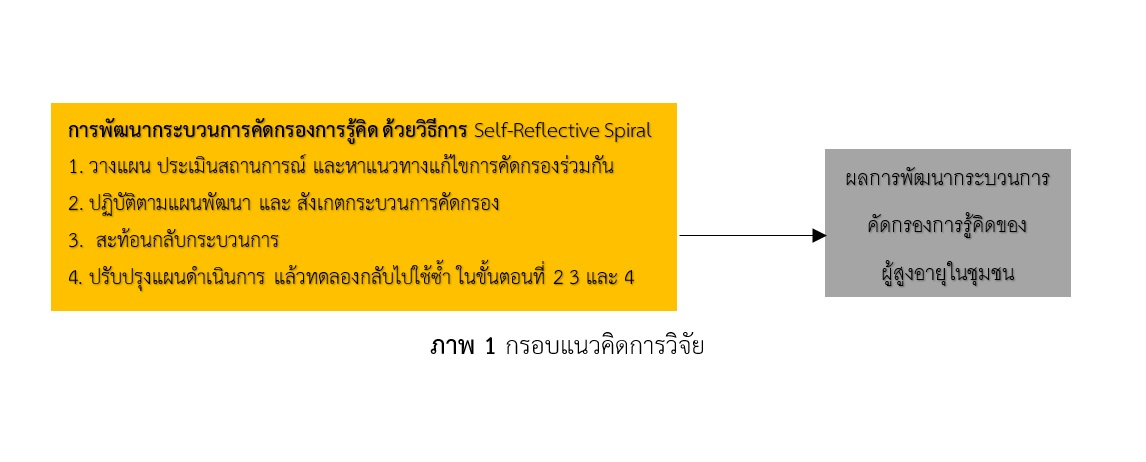การพัฒนากระบวนการคัดกรองการรู้คิดของผู้สูงอายุในชุมชน
คำสำคัญ:
แบบทดสอบสภาพสมอง, AMT, กระบวนการคัดกรองการรู้คิด, ผู้สูงอายุในชุมชนบทคัดย่อ
การวิจัยและพัฒนานี้ มีวัตถุประสงค์เพื่อ 1) อธิบายสถานการณ์การคัดกรองการรู้คิด 2) พัฒนากระบวนการคัดกรองการรู้คิด 3) ตรวจสอบคุณภาพแบบทดสอบ AMT (Abbreviated Mental Test) และ 4) ประเมินผลการคัดกรองจากการพัฒนากระบวนการคัดกรองการรู้คิดของผู้สูงอายุในชุมชน กลุ่มตัวอย่าง เป็นผู้สูงอายุ ตั้งแต่ 60 ปีขึ้นไป ในจังหวัดอุดรธานี จำนวน 446 คน สุ่มกลุ่มตัวอย่างแบบ Cluster Sampling เครื่องมือที่ใช้ เป็น โครงการพัฒนากระบวนการคัดกรอง แบบทดสอบสภาพสมอง AMT และ MMSE (Mini-Mental State Examination) แบบประเมินตนเอง และฐานข้อมูล Aging Survey Udonthani วิเคราะห์ข้อมูลเชิงปริมาณด้วยสถิติเชิงพรรณนา ข้อมูลเชิงคุณภาพ ใช้ Content Analysis ผลการวิจัยพบว่า
1. สถานการณ์การคัดกรองการรู้คิดขั้นต้นในการตรวจสุขภาพผู้สูงอายุประจำปี ทำโดย อาสาสมัครสาธารณสุขประจำหมู่บ้าน โดยใช้แบบทดสอบ AMT พบความผิดปกติเพียง ร้อยละ 1.1 ของกลุ่มตัวอย่าง และพบว่าร้อยละ 84.2 ของเจ้าหน้าที่ในโรงพยาบาลส่งเสริมสุขภาพตำบล ไม่เคยใช้แบบคัดกรอง AMT และ MMSE
2. การพัฒนากระบวนการ ทำโดยให้ความรู้ และฝึกทักษะการคัดกรอง ฝึกลงฐานข้อมูล ให้กับพยาบาลและเจ้าหน้าที่สาธารณสุข ร่วมกับการประเมินผลติดตามเป็นระยะ
3. ผลการตรวจสอบคุณภาพแบบทดสอบ AMT พบว่าคำถามบางข้อมีข้อจำกัดเชิงบริบทและวัฒนธรรม ไม่เหมาะกับผู้สูงอายุในชุมชน
4. การประเมินผลหลังการพัฒนา พบว่า พยาบาล และ เจ้าหน้าที่ สามารถคัดกรองการรู้คิดได้ตามแนวทางคู่มือคัดกรอง ยกเว้น ไม่สามารถจัดพื้นที่คัดกรองให้เหมาะสมได้ ผู้สูงอายุส่วนใหญ่ รู้สึกสบายใจ และมั่นใจในผลคัดกรองที่ถูกประเมินโดยพยาบาลหรือเจ้าหน้าที่ เมื่อคัดกรองใหม่ พบความผิดปกติของการรู้คิดในผู้สูงอายุกลุ่มเดียวกัน สูงขึ้น 24 เท่า ส่วนการคัดกรองด้วย MMSE พบผลผิดปกติ ร้อยละ 12.3
ควรมีการปรับข้อคำถามของ AMT หรือเปลี่ยนแบบคัดกรองเพื่อการคัดกรองที่มีความเที่ยงตรงตามโครงสร้างมากขึ้น และการคัดกรองควรทำโดยพยาบาลหรือเจ้าหน้าที่ที่ผ่านการอบรม
เอกสารอ้างอิง
Alzheimer’s Disease International. (2019). World Alzheimer Report 2019: Attitude to Dementia. London: Alzheimer’s Disease International
Chayovan, N., & Knodel, J. (1993). Age and Birthdate Reporting in Thailand: Evidence from the 1987 Demorgraphic and Health Survey. Retrieved from Columbia, Maryland
Department of Medical Services Ministry of Public Health Thailand. (2015). Geriatric Screening and Assessment Tool Kit. Bangkok: WVO Officer of Printing Mill.
Folstein, M. F., Robins, L. N., & Helzer, J. E. (1983). The Mini-Mental State Examination. Arch Gen Psychiatry, 40(7), 812.
Foroughan, M., Wahlund, L. O., Jafari, Z., Rahgozar, M., Farahani, I. G., & Rashedi, V. (2017). Validity and Reliability of the Abbreviated Mental Test Score (AMTS) among Older Iranian. Psychogeriatrics, 17(6), 460-465.doi:10.1111/psyg.12276
Hodkinson, H. M. (1972). Evaluation of a Mental Test Score for Assessment of Mental Impairment in the Elderly. Age Ageing, 1(4), 233-238.
Institute of Geriatric Medicine Department of Medical Services Ministry of Public Health. (2008). Medical Technology Assessment: A Comparison of Mini-Mental State Examination-Thai (MMSEThai) 2002 and Thai Mini-Mental State Examination (TMSE) for Screening Older Persons with Dementia. Retrieved from Nonthaburi.
Jitapunkul, S., Pillay, I., & Ebrahim, S. (1991). The Abbreviated Mental Test: Its Use and Validity. Age Ageing, 20(5), 332-336.
Julayanont, P., Tangwongchai, S., Hemrungrojn, S., Tunvirachaisakul, C., Phanthumchinda, K., Hongsawat, J., et al, (2015). The Montreal Cognitive Assessment-Basic: A Screening Tool for Mild Cognitive Impairment in Illiterate and Low-Educated Elderly Adults. J Am Geriatr Soc, 63(12), 2550-2554. doi:10.1111/jgs.13820
Kardtip, T., Monkong, S., & Malathum, P. (2019). Health Status of Older Adults with Cognitive Impairmen. Journal of Thai Nursing and Midwifery Council, 34(1), 104-121.
Kemmis, S., McTaggart, R., & Nixon, R. (2014). The Action Research Planner: Doing Critical Participatory Action Research. NewYork: Springer.
Kongkirati, P. (2005). And Then the Movement Appears Politics and Culture of Students and Scholars Before 14 October (in Thai). Bangkok: Thammasat University Press.
Kusalaruk, P., & Nakawiro, D. (2012). A Validity Study of the Mini-Cog Test in Thai Dementia Patients. Ramathibodi Medical Journal, 35(4), 264-271.
Ministry of Public Health. (2014). The Guideline of Health Data Center Version 2.0. Nonthaburi: Information and Communications Technology Center.
Ministry of Public Health (2019). Health Data Center. Retrieved November 17th, 2019 from https://hdcservice.moph.go.th/hdc/reports/report.php?
source=pformated/format1.php&cat_id=6966b0664b89805a484d7ac96c6edc48&id=df0700e8e3c79802b208b8780ab64d61
Ministry of Public Health (2020). Health Data Center. Retrieved February 25th, 2020 from https://hdcservice.moph.go.th/hdc/reports/report.php?source=pformated/format1.php&cat_id=6966b0664b89805a484d7ac96c6edc48&id=df0700e8e3c79802b208b8780ab64d61
Nakawiro, D., Chansirikar, S., Srisuwan, P., Aebthaisong, O., Sudsakorn, P., Vidhyachak, C., et al. (2017). Group-Based Training of Executive Function, Attention, Memory and Visuospatial Function (Team-V) in Patients with Mild Neurocognitive Disorder. J Psychiatr Assoc Thailand, 62(4), 337-348.
Nicoles, E. (2018). Global, Regional, and National Burden of Alzheimer's Disease and Other Dementias, 1990-2016: a Systematic Analysis f the Global Burden of Disease Study 2016. Lancet Neurol, 18(1), 88-106. doi:10.1016/s1474-4422(18)30403-4
Petersen, R. C., Lopez, O., Armstrong, M. J., Getchius, T. S. D., Ganguli, M., Gloss, D, et al. (2018). Practice Guideline Update Summary: Mild Cognitive Impairment: Report of the Guideline Development, Dissemination, and Implementation Subcommittee of the American Academy of Neurology. Neurology, 90(3), 126-135. doi:10.1212/WNL.0000000000004826
Piotrowicz, K., Romanik, W., Skalska, A., Gryglewska, B., Szczerbinska, K., Derejczyk, et al. (2018). The Comparison of the 1972 Hodkinson's Abbreviated Mental Test Score (AMTS) and its variants in screening for cognitive impairment. Aging Clin Exp Res. doi:10.1007/s40520-018-1009-7
Prasartkul, P., Vapattanawong, P., Rittirong, J., Chuanwan, S., Kanchanachitra, M., Jaratsit, S., et al. (2019). The Situation of the Thai Elderly in 2017. Bangkok: Institute for Population and Social Research, Mahidol University and Foundation of Thai Gerontology Research and Development Institute (TGRI).
Rocca, W. A., Bonaiuto, S., Lippi, A., Luciani, P., Pistarelli, T., Grandinetti, A., et al (1992). Validation of the Hodkinson Abbreviated Mental Test as a Screening Instrument for Dementia in an Italian Population. Neuroepidemiology, 11(4-6), 288-295. doi:10.1159/000110943
Soontreewong, S., Suwan, P., Jantharamolee, S., & Srisupanan, M. (2019). Development of a Model for Improving Job Performance of Village Health Volunteers from in Trang Municipality, Trang Province. The Southern College Network Journal of Nursing and Public Health, 6(1) 75-88.
Taherdoost, H. (2017). Determining Sample Size; How to Calculate Survey Sample Size International Journal of Economics and Management Systems, 2.
Trongsakul, S., Lambert, R., Clark, A., Wongpakaran, N., & Cross, J. (2015). Development of the Thai Version of Mini-Cog, a Brief Cognitive Screening Test. Geriatrics & Gerontology International, 15(5), 594-600. doi:10.1111/ggi.12318
World Health Organization. (2017). Global Action Plan on the Public Health Response to Dementia 2017–2025. Geneva: World Health Organization.
World Health Organization. (2019). Fact Sheet on Dementia. Geneva. World Health Organization.

ดาวน์โหลด
เผยแพร่แล้ว
ฉบับ
ประเภทบทความ
สัญญาอนุญาต
1. บทความหรือข้อคิดเห็นใด ๆ ที่ปรากฏในวารสารเครือข่าย วิทยาลัยพยาบาลและการสาธารณสุขภาคใต้ ที่เป็นวรรณกรรมของผู้เขียน บรรณาธิการหรือเครือข่ายวิทยาลัยพยาบาลและวิทยาลัยการสาธารณสุขภาคใต้ ไม่จำเป็นต้องเห็นด้วย
2. บทความที่ได้รับการตีพิมพ์ถือเป็นลิขสิทธิ์ของ วารสารเครือข่ายวิทยาลัยพยาบาลและการสาธารณสุขภาคใต้







